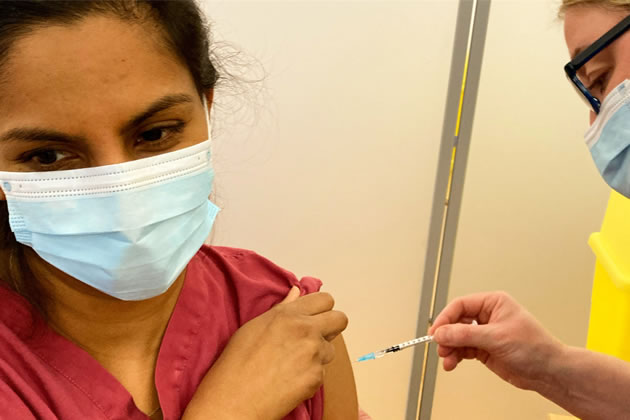'More Needs To Be Done' On BAME Vaccine Take Up
Ealing Hospital doctor says community leaders must help tackle disinformation

Dr Papineni receives her first dose of the vaccine. Picture: Dr Padmasayee Papineni
January 19, 2021
An Ealing hospital doctor has said there is “work to be done” to encourage black, Asian and ethnic minority communities to get the coronavirus vaccine.
Dr Padmasayee Papineni, who is a consultant in infectious diseases, is urging people to have the jab once it’s offered to them as it is part of the solution to ending the pandemic.
Dr Papineni herself has had the first dose of the vaccine, after a year of leading at London North West University Healthcare NHS Trust in trying to understand the virus, what treatments work and playing a role in clinical trials.
Before coronavirus, the expert focused on much older diseases such as tuberculosis and HIV, and has praised the extent of progress seen to combat Covid-19 in just one year.
She said, “There’s a lot of worry over ‘how did they manage to create a vaccine that works so quickly’?
“It goes to show if you have a condition that affects the majority of the world with the political, scientific and financial commitment, it shows what you can achieve.”
Dr Papineni highlighted that some BAME people have concerns about the vaccine due to historical wrongs but that they are also among the groups that have had a huge burden of coronavirus.
She added, “At the moment our focus is on the patients we’re seeing right now more in an emergency setting but there is a lot of work that needs to be done in the community to educate and encourage people to take up the vaccine.
“There is hesitancy within the black community and also Asian [community], I think it’s going to have to be leaders within those communities to try and communicate and educate and encourage people.”
Dr Papineni said these groups have been very affected not only in the first wave but also now, and also represents the demographic of people who are unable to work from home such as in the gig economy, and are younger patients in their 40s, 50s and 60s.
“More people appeared to be furloughed in the first wave and were able to not work, but this time, I think really there’s no blame put on patients here, if you don’t work, you don’t get money, and you can’t feed yourself and your family.”
In Ealing, the council is working with community leaders to try and engage residents positively, such as through providing information and resources for them to spread key messages.
And the Sri Guru Singh Sabha Southall Gurdwara organisation – the largest outside of India – is taking part in a national campaign to spread awareness and debunk myths for its members.
The Sikh Council is hosting a bilingual webinar with medical experts on Thursday, January 21, which will be broadcast and shared with Sikh TV channels and radio stations.
Webinar organiser and spiritual director Sukhjeevan Singh said that elderly members of the Sikh community can be particularly vulnerable to misinformation due to language barriers, and from higher usage of WhatsApp where fake messages such as on DNA manipulation are being shared.
Concerns from members have also flagged ingredients and suitability for vegetarians, and whether people with underlying health conditions – such as diabetes - could have an adverse reaction to the vaccine.
Mr Singh also said a deeper cultural issue lies behind it due to historical crimes committed against indigenous communities, and in India, the history of colonialism.
He added, “It is a mistrust of anything that is western, it needs some convincing…
“The message we will be sharing on the webinar, minority communities around the world we have got where we are by looking out for one another, a really strong ethos of helping one another.
“We need to look at the vaccine from a more compassionate point of view. It’s not just about keeping ourselves safe, but herd immunity we are not going to get back to normal without vaccinating.
“We’re drawing from faith for the webinar, the religious duty of people to get vaccinated.”
Meanwhile, Dr Papineni also highlighted that many people haven’t had the experience of living with infectious diseases because of vaccinations.
For example, she said, “My dad had an older brother who died in the 1950s of diphtheria, it’s not a condition people will hear about because it’s vaccine preventable.”
At Ealing hospital, the Southwark resident said treatments for coronavirus have improved over the year, and it is “very encouraging” to see patients responding to their methods.
Capacity for non-invasive ventilation has also increased despite the “huge strain” it places on staff.
But she added, “I think for everyone being able to get people patients discharged and back home and to their families is really why we do it, and for every single patient we can achieve that, we feel happy we’re pleased and encouraged by that.”
To find out more about the Sikh Council webinar on the Covid-19 vaccine click here.
Anahita Hossein-Pour - Local Democracy Reporter